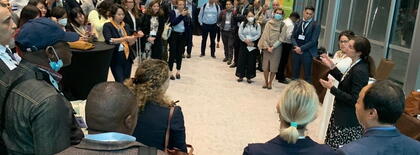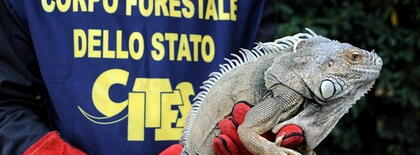4th Global Meeting of Wildlife Enforcement Networks
The Secretariat of the Convention on International Trade in Endangered Species of Wild Fauna and Flora (CITES), in cooperation with its partners from the International Consortium on Combating Wildlife Crime (ICCWC) and with generous funding support from the United States of America convened the Fourth Global Meeting of Wildlife Enforcement Networks on 21 to 22 November 2023, alongside the 19th meeting of the Conference of the Parties to CITES (CoP19), in Panama.
The meeting provided a platform for further enhancing synergies between existing initiatives and regional enforcement bodies, strengthening cooperation at regional and global levels, and exploring potential activities to be pursued with the aim of further strengthening responses to wildlife crime.

The report of the meeting is available here.
The agenda of the meeting is available here.
The press release is available here.
Directory of network focal points
Directories of wildlife enforcement network focal points, and other enforcement and species specific focal points can be found here.
Network Information Sheets and Presentations
Information Sheets:
Association of Southeast Asian Nations Working Group on CITES and Wildlife Enforcement (ASEAN CITES and WE); China National Inter-agencies CITES Enforcement Coordination Group (NICEGG); Commission of Central African Forests / Central Africa WEN (COMIFAC); European Commission Enforcement Working Group ; European Union Agency for Law Enforcement Cooperation (EUROPOL) ;Horn of Africa Wildlife Enforcement Network (HA-WEN); Latin American Environmental Prosecutors Network / South America Wildlife Enforcement NetworkWEN (SudWEN); Lusaka Agreement Taskforce (LATF); North America Wildlife Enforcement Group (NAWEG); Red de Observancia y Aplicación de la Normativa Silvestre para Centroamérica y República Dominicana / Central America WEN (ROAVIS); Rhino and Elephant Security Group (RESG); South Asia Wildlife Enforcement Network (SAWEN) and; World Customs Organization (WCO) Regional Intelligence Liaison Offices (RILO) of Central Africa and West Africa.
Presentations
All content and materials included in the presentations is the sole responsibility of the respective presenters.
Session 1 - Outcomes from the 3rd Global meeting of WENs and activities undertaken in this regard
- ICCWC Guidelines for Wildlife Enforcement Networks, Edward van Asch, CITES Secretariat
- Implementation of WEN guidelines and targeted ICCWC support to SudWEN and HAWEN – Javier Montano Duran, UNODC
- Operational support/activities: ICCWC Thunder-series of Operations and other activities since the 3rd Global meeting of WENs - Igor Jakupic, WCO
- Feedback from HAWEN and SudWEN on implementation of WEN guidelines and next steps (representative from HAWEN and SudWEN) – Marie Sophie Delassade, on behalf of IGAD and Cecilia de las Casas Cadillo, SudWEN
- United for Wildlife Global Coalition - Xu Ling, TRAFFIC
Session 2 – Increased collaboration and communication, both within and between networks
- Association of Southeast Asian Nations Working Group on CITES and Wildlife Enforcement (ASEAN WG on CITES and WE) – Ms. Thuy, Vietnam
- China National Inter-agencies CITES Enforcement Coordination Group (NICE-CG) - Ji Jing, CCMA
- European Commission Enforcement Working Group - Jamie Bouhuys, EU
- Lusaka Agreement Taskforce (LATF) - Edward Phiri and Arnaud Zonleleth Berenger, LATF
- Red de Observancia y Aplicación de la Normativa Silvestre para Centroamérica y República Dominicana / Central América WEN (ROAVIS) – Fátima Sánchez, ROAVIS
- Rhino and Elephant Security Group (RESG) – Renatus Kusamba, RESG
- South Asia WEN (SA-WEN) - Maheshwar Dhakal, SA-WEN
Session 3 - Exploring opportunities to further enhance synergies and collaboration
- GWP’s insights on national and sub-national law enforcement interagency collaboration – Monica Zavagli, World Bank
- Coalition to End Wildlife Trafficking Online (TRAFFIC/IFAW) - Xu Ling, TRAFFIC
- U.S. International Law Enforcement Attaché Programme (USFWS) - Bryan Landry, USFWS
- IMO Guidelines on Illegal Wildlife Trade (IWT) – Brian Gonzales, WWF
- Opportunities for collaboration with CSOs - Adrian Reuter and Kurt Duchez – WCS on behalf of NGO partners
Session 5 – Promoting the use of existing tools and services
- 2nd edition of the ICCWC Wildlife and Forest Crime Analytic Toolkit and Indicator Framework and UNODC tools on addressing corruption – Javier Montano Duran and Tim Steele, UNODC
- Strengthening capacity to mobilize financial investigations into wildlife crime – Monica Zavagli, World Bank
- INTERPOL Notices and combating wildlife crime linked to the internet: support available and tools developed – Ilona Kononenko-Rivet, INTERPOL
- ENVIRONET and new online courses on combating wildlife crime for Customs officers - Igor Jakupic, WCO
Session 6 - Operational support and opportunities for WEN engagement
- INTERPOL Regional Bureaus – INTERPOL on behalf of Mrs Chantal Apendeki Cinene
- ASEANAPOL and Royal Thai Police – Pol.Maj.Gen. Khemmarin Hassiri, Royal Thai Police
Session 8 – Identification of key wildlife crime trends and associated matters and engagement in operational activities at global/regional level
- Illegal wildlife trade trends identified in the World Wildlife Crime report – Angela Me, UNODC
- Species affected by wildlife crime under discussion at CoP19 - Clio Di Giovanni, CITES Secretariat
- CITES illegal trade reports and enhancing data availability - Clio Di Giovanni, CITES Secretariat and Angela Me, UNODC
The meeting followed the first, second and third global meetings held respectively in the margins of CITES CoP16 (Bangkok, 2013), CITES CoP17 (Johannesburg, 2016) and CITES CoP18 (Geneva, 2019).
Related content
Our Focus: Wildlife and Forest Crime
What is wildlife and forest crime? ICCWC considers ‘wildlife’ to include all wild fauna and flora, including animals, birds and fish, as well as timber and non-timber forest products. ‘Wildlife crime’ refers to the illegal taking, trading (supplying, selling or trafficking), importing, exporting, processing, possessing, obtaining and consumption of wild...
Wildlife Enforcement Networks (WENs)
What are Wildlife Enforcement Networks? Regional and inter-regional cooperation is essential to combating wildlife trafficking effectively. A number of networks with different purposes and objectives focused on combating wildlife crime, and with varying degrees of formality and organization, have been developed across the world. In most cases these networks are...
Our Approach
ICCWC works with officials from across the criminal justice system in countries around the world, to strengthen these systems and provide authorities with coordinated support to combat wildlife and forest crime. ICCWC Vision 2030 and Strategic Action Plan 2023 - 2016 The ICCWC Vision 2030 was launche d at the...



